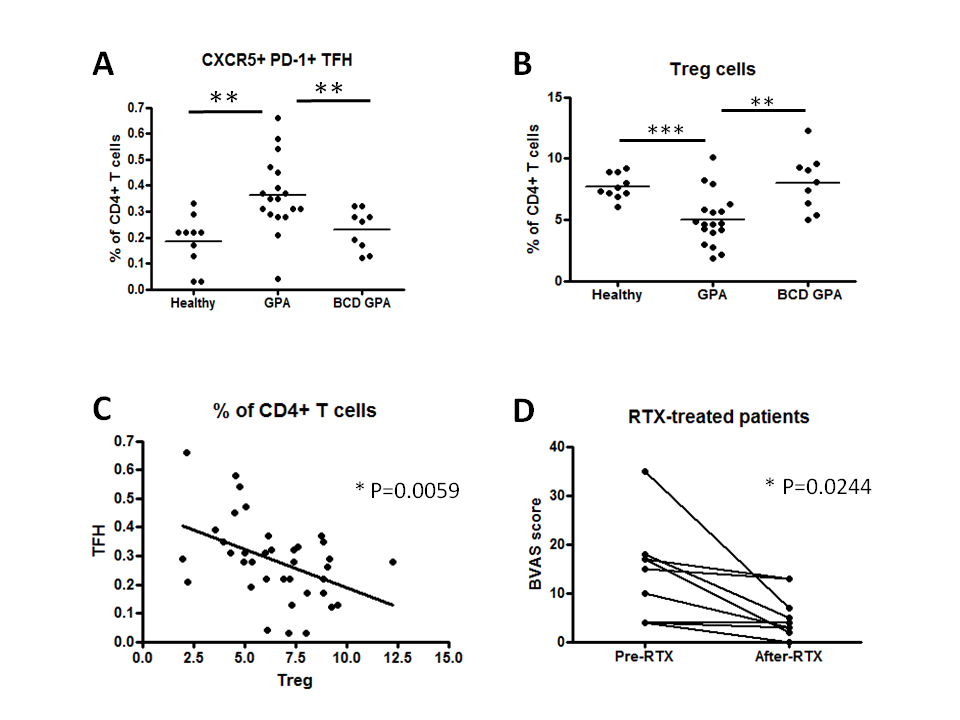Session Information
Session Type: Abstract Submissions (ACR)
Background/Purpose:
Granulomatosis with polyangiitis (GPA, formerly known as Wegener’s granulomatosis) is a rare and sometimes fatal systemic autoimmune disease. Anti-neutrophil cytoplasmic antibodies (ANCAs) specific for proteinase 3 (PR3) are associated with GPA. Remissions in GPA can be achieved through B cell depletion therapy. However, the mechanism is not yet clear.
Methods:
The frequencies of T follicular helper cells (TFH) and regulatory T cells (Treg) from 27 GPA patients including 9 rituximab treated patients and 10 healthy controls were studied by flow cytometry. Disease activity was assessed by the Birmingham Vasculitis Activity Score (BVAS) and clinical data was collected in all patients. The functional capacity of Tregs was assessed by in vitro co-culture assays.
Results:
The average (range) age was 51 (25-83), and disease duration was from less than 1 year up to 25 years. The mean BVAS scores in rituximab treated patients and those on conventional therapy were 5.56 and 9.67 respectively. We observed an increased frequency of TFH (P=0.0013) and a reduced frequency of antigen experienced Treg (P<0.0001) in peripheral blood from GPA patients on conventional therapies but not in those treated with rituximab compared to healthy controls (figure A & B). The frequencies of TFH and Treg were significantly inversely correlated (P=0.0059, figure C). Furthermore, the ratio of TFH to Treg was significantly higher in GPA patients on conventional therapies (average 9.07) than in GPA patients treated with rituximab (average 2.43; P=0.0002), who were clinically improved or controls (figure D). Whereas Tregs were numerically reduced in individuals with GPA on conventional therapy (average 5.03%, P=0.0009), the suppressive capacity of Tregs on a per cell basis is not significantly altered in these individuals compared to healthy controls (P=0.23).
Conclusion:
Our study demonstrates increased TFH cells and decreased antigen experienced Treg cells in GPA patients on conventional therapies compared to controls. Patients undergoing B cell depletion therapy were indistinguishable from controls. The negative correlation between TFH and Treg cells implies that the balance between T cell subsets and its B cell dependence impact on disease activity in GPA.
Disclosure:
Y. Zhao,
None;
J. Thomas,
None;
S. Sangle,
None;
P. M. K. Lutalo,
None;
L. M. Choong,
None;
J. R. Tyler,
None;
J. Spencer,
None;
T. Tree,
None;
D. P. D’Cruz,
None.
« Back to 2012 ACR/ARHP Annual Meeting
ACR Meeting Abstracts - https://acrabstracts.org/abstract/t-follicular-helper-cell-and-regulatory-t-cell-frequencies-are-affected-by-b-cell-depletion-in-patients-with-granulomatosis-with-polyangiitis/

